|
|
|
Sort Order |
|
|
|
Items / Page
|
|
|
|
|
|
|
| Srl | Item |
| 1 |
ID:
159910
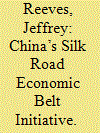

|
|
|
|
|
| Summary/Abstract |
This article demonstrates that, rather than constituting a new model for Central Asian international relations, the SREB’s real strategic value for China is as an organizational concept and as an influence multiplier. In recasting its Central Asian bilateral relations as part of the SREB engagement model, Beijing has overlaid a strategic-level concept to its otherwise disparate patterns of engagement. In so doing, the Xi administration has consolidated its multiple lines of efforts and the diverse Chinese-based actors—both state and private—into a grand narrative: one that serves the strategic purpose of integration. The Xi administration has used (and is using) this integration to expand its influence throughout the Central Asian region, both through its bilateral relations and through a SREB-resulting network of Central Asian states. In particular, one sees regular instances within China’s SREB engagement where the Xi administration uses the initiative to reconstitute regional states’ development priorities, interests and relations in ways that benefit China’s overall strategic interests.
|
|
|
|
|
|
|
|
|
|
|
|
|
|
|
|
| 2 |
ID:
159911
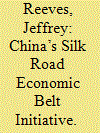

|
|
|
|
|
| Summary/Abstract |
This article demonstrates that, rather than constituting a new model for Central Asian international relations, the SREB’s real strategic value for China is as an organizational concept and as an influence multiplier. In recasting its Central Asian bilateral relations as part of the SREB engagement model, Beijing has overlaid a strategic-level concept to its otherwise disparate patterns of engagement. In so doing, the Xi administration has consolidated its multiple lines of efforts and the diverse Chinese-based actors—both state and private—into a grand narrative: one that serves the strategic purpose of integration. The Xi administration has used (and is using) this integration to expand its influence throughout the Central Asian region, both through its bilateral relations and through a SREB-resulting network of Central Asian states. In particular, one sees regular instances within China’s SREB engagement where the Xi administration uses the initiative to reconstitute regional states’ development priorities, interests and relations in ways that benefit China’s overall strategic interests.
|
|
|
|
|
|
|
|
|
|
|
|
|
|
|
|
| 3 |
ID:
116059
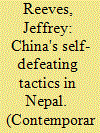

|
|
|
|
|
| Publication |
2012.
|
| Summary/Abstract |
China's use of coercion and its myopic focus on Tibetan issues in Nepal are undermining Nepalese public support for China's involvement in Nepal. If China desires continued, constructive contact with Nepal, it must alter its foreign policy approach accordingly. Yet all indications suggest that China will continue with its status quo policies toward Nepal in the near and medium term. This suggests that China's relations with Nepal will become more complicated in the future.
|
|
|
|
|
|
|
|
|
|
|
|
|
|
|
|
| 4 |
ID:
126869
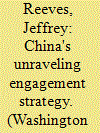

|
|
|
| 5 |
ID:
140773
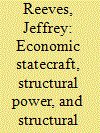

|
|
|
|
|
| Summary/Abstract |
This article employs the concepts of structural power and structural violence to a undertake critical study of China’s use of economic statecraft toward Kyrgyzstan. The article argues that China’s reliance on economic exchange to secure its strategic ends in Kyrgyzstan has resulted in asymmetric economic exchange between the two states. Through this asymmetric exchange, China has gained influence over Kyrgyzstan’s domestic structures. Chinese structural power, in turn, contributes to violence across Kyrgyzstan’s structures of economy, environment, and society and within the country’s state-society relations. Structural violence within Kyrgyzstan also results in periphery instability and domestic insecurity for China. As such, the article argues that China’s use of economic statecraft to achieve its strategic aims in Kyrgyzstan is self-defeating.
|
|
|
|
|
|
|
|
|
|
|
|
|
|
|
|
| 6 |
ID:
148931
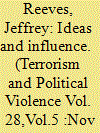

|
|
|
|
|
| Summary/Abstract |
This article demonstrates how scholarship on terrorism in China has provided the intellectual backdrop against which China's leadership has developed the country's counterterrorism institutions, policies, and laws. Building on the linkages between scholarship and policy-making, the article suggests potential avenues for policy reform in China's current counterterrorism architecture.
|
|
|
|
|
|
|
|
|
|
|
|
|
|
|
|
| 7 |
ID:
158650
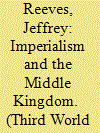

|
|
|
|
|
| Summary/Abstract |
This article applies the Nexon/Wright concept of ideal-type empire to the study of China’s post-2012 peripheral relations to demonstrate that the Xi administration is engaged in a concerted imperialist policy towards its developing neighbour states. Using the Nexon/Wright framework, the article demonstrates how the establishment of a China-centric regional network structure undergirds the Xi administration’s key foreign policy concepts and how these concepts, in turn, inform China’s bilateral relations with its peripheral states. To demonstrate how China employs imperialist tactics to its pursuit of a regionally based order, the article examines China’s bilateral relations with the developing states on its periphery: Mongolia, Kazakhstan, Tajikistan, Kyrgyzstan, Afghanistan, Pakistan, Nepal, Myanmar, Cambodia, Lao PDR and Vietnam.
|
|
|
|
|
|
|
|
|
|
|
|
|
|
|
|
| 8 |
ID:
105220
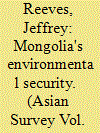

|
|
|
|
|
| Publication |
2011.
|
| Summary/Abstract |
This article examines China's "unconscious power" over Mongolia's environmental sector. It argues that Ulaanbaatar's state weakness and Chinese unconscious power constitute a mutually reinforcing threat to Mongolia's environmental security
|
|
|
|
|
|
|
|
|
|
|
|
|
|
|
|
| 9 |
ID:
118575
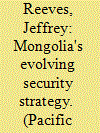

|
|
|
|
|
| Publication |
2012.
|
| Summary/Abstract |
With the publication of its 2010 National Security Concept and its 2011 Foreign Policy Concept, Ulaanbaatar has formalised a shift in foreign policy that has been readily apparent since 2000. Whereas Mongolia's foreign policy for the 1990s was formulated around an omni-enmeshment strategy, its foreign policy from 2000 onward is best conceptualised as an amalgam of omni-enmeshment and balance of influence. Ulaanbaatar's new foreign policy strategy implicitly identifies China as the country's largest security concern. This sense of a China 'challenge' is mirrored in Ulaanbaatar's post-2000 foreign policy relations.
|
|
|
|
|
|
|
|
|
|
|
|
|
|
|
|
| 10 |
ID:
123007
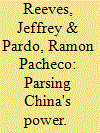

|
|
|
|
|
| Publication |
2013.
|
| Summary/Abstract |
This article draws on Michael Barnett and Raymond Duvall's power typology to examine Chinese power in Sino-Mongolia and Sino-North Korean relations. Using compulsory, institutional, productive, and structural power to frame these bilateral relations, this article looks at the means by which China obtains power and how it utilizes power in relation to Mongolia and the Democratic People's Republic of Korea. This article also examines Mongolian and North Korean perceptions and responses to Chinese power. Concurrently, the article considers the Barnett/Duvall model's applicability to China's relations with other periphery developing states.
|
|
|
|
|
|
|
|
|
|
|
|
|
|
|
|
| 11 |
ID:
120727
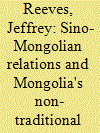

|
|
|
|
|
| Publication |
2013.
|
| Summary/Abstract |
The following article examines the effect China has on Mongolia's non-traditional security. Using the Copenhagen School's approach to non-traditional security, the article argues that Mongolia's economic dependence on China coupled with weak political security have allowed China to develop structural power over Mongolia's domestic institutions. This structural power also negatively affects Mongolia's societal and environmental security. Chinese structural power, therefore, has a net negative effect on Mongolia's domestic non-traditional security, despite Chinese policies that seek to maintain good relations with Mongolia. This suggests that China is not in complete control of its relations with Mongolia and that its use of economic ties to drive relations with Mongolia contains elements that ultimately undermine its position and Mongolia's security.
|
|
|
|
|
|
|
|
|
|
|
|
|
|
|
|
| 12 |
ID:
131953
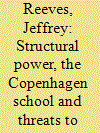

|
|
|
|
|
| Publication |
2014.
|
| Summary/Abstract |
This article engages with current debates surrounding China's security by employing the concept of structural power and the Copenhagen School approach to security studies to measure threats to China's security. Building on existing Chinese and English language research on China's security drivers, the article develops a mechanism for determining how China's economic relations with small states in Asia negatively affect their domestic stability and how this instability then loops back to undermine China's strategic position. The article uses China's relations with Cambodia, Nepal and Mongolia as case studies.
|
|
|
|
|
|
|
|
|
|
|
|
|
|
|
|
| 13 |
ID:
134619
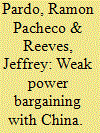

|
|
|
|
|
| Summary/Abstract |
This article examines Mongolia's and North Korea's bargaining with the People's Republic of China to provide insight into Northeast Asian regional dynamics and weak state bargaining behavior. The article demonstrates how both Mongolia and North Korea (which it demonstrates are weak states) employ a variety of tactics within the categories of capitulation, neutrality and confrontation when managing their respective relations with China. The article also argues the applica`bility of the two case studies to a better understanding of the diplomatic challenges China faces as it continues its development and to China's relations with the various weak states on its periphery.
|
|
|
|
|
|
|
|
|
|
|
|
|
|
|
|
|
|
|
|
|